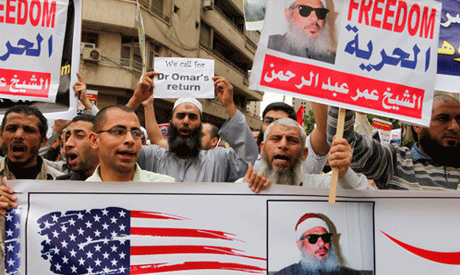
Salafi supporters of Egyptian cleric Sheikh Omar Abdel-Rahman call for his release in front of the US embassy in Cairo (File Photo: Reuters)
The first Salafi conference held by Al-Nour Party in Alexandria deserves a closer look and a different reading of the state of Salafis beyond the blasé and sometimes alienating method by which the Egyptian media deals with the Salafi issue in general. Since the arrival of the Salafis on the political scene, the media machine has only dealt with them in a traditional manner —sometimes leaning towards incitement and shallow coverage without presenting the complex and complicated nature of the Salafi scene, to uncover the dormant potential of political growth within the trend. The Alexandria conference would have been an opportunity to find out other facets of the Salafi movement, but unfortunately the Egyptian media squandered the opportunity.
The first issue of note for observers is that the new Salafi party chose to hold its first broad conference in a public place instead of at one of the many mosques they own in Alexandria. There was a clear message they promoted and confirmed, namely a complete separation between the party, its activities, and the proselytisation movement it belongs to. The irony is that while Al-Nour Party was able to resolve this issue early on —even before it was born —the Muslim Brotherhood and its Freedom and Justice Party remain confused on the matter and unable to resolve it.
A second issue of note is the message of openness that the new Salafi party is keen on promoting, inviting the participation of all political factions and forces, as well as new parties or ones still under construction. They also invited Christians and a representative of Al-Seyouf Church in the district where the conference was held, as well as large numbers of foreign media and provided simultaneous translation into English with extensive explanation for foreign attendees.
Another remarkable step was inviting speech and hearing impaired people —a segment that all other political parties had ignored —and signing them up in the party and explaining the party programme to them. For the first time ever, there was sign language interpretation for all events at the conference and this segment was strongly present.
Things looked promising and demonstrated that this Salafi party is unlike anything we expected. While the content was important, it would be difficult to detail all the political speeches that were made, which were naturally heavy on religious rhetoric. It is noteworthy, however, that this is a Salafi group discussing the “Egyptian state” and holding extensive debate about Egypt and its future, which will never be a Taliban state or even like Saudi Arabia. Other models were promoted as inspiration, such as Turkey and Malaysia.
For the first time, Salafi youth discussed economic issues in detail and there was also debate about development and progress. This is a completely novel agenda that demonstrates that a segment of Salafis are about to make a big entrance onto the political scene. But this won’t be easy because of root and complex problems, some of them structural, which plague this endeavour. Observers can see the disparity that although the leadership has attracted a wide popular base and is informed politically (figures such as Emad Abdel-Ghaffour), it seems to be under pressure from an old guard whose ideas need to be modernised.
The Salafi base was built on proselytising rhetoric rooted in religious debate without much attention to politics. Anything relating to politics dates back to before the establishment of states and barely recognises their legitimacy, if at all. Any thoughts about politicians are based on the sultanate state that does not recognise the modern state, citizenship, or the separation of powers —nothing that we are living, or even contemporary political reality. Now, suddenly, they are delving into the issues of political parties, the state, parliamentary elections, Salafi representation in parliament or the presidency, and many other complex questions that they never cared for or were allowed to ponder under Mubarak’s authoritarian, tyrannical and oppressive regime, let alone consider exercising.
This base requires intense political investment to enable it to deal with the progressive ideas that the party’s leadership is proposing. This leads us to another point, namely that despite assurances that there is separation between preaching and politics, and that the leaders and founders of the proselytising school allow the party complete independence and freedom of action (unlike the Muslim Brotherhood, for example), I believe more is needed than a mere decision to separate proselytising and politics. The path of the movement and attention of Salafi proselytising leaders should converge onto the new problems facing the nascent Salafi political entity, which requires them to take the courageous decision of intellectual and political openness.
One must admit that currently the Salafis, especially the Wahabis among them, are not offering what is needed to establish a political project. Accordingly, their leaders should embrace intellectual openness to allow the political movement to acquaint itself with Islamic discourse and debate, to help it outline a new political vision. I believe that many Salafi leaders, especially Sheikh Mohamed Ismail Al-Moqaddem, the founder of the group, have enough energy and inner strength to sponsor such political and intellectual debate, to expand the realm of Salafi political thought.
There is promise in incorporating the Salafi phenomenon when building a modern Egyptian state, but the challenges are immense. Part of this is the responsibility of Salafis, but another part lies with other political players, such as secularists, in helping the group, bringing it closer to the spirit and reason of an all-inclusive Egyptian state.
The writer is an expert on Islamic movements.
Short link: